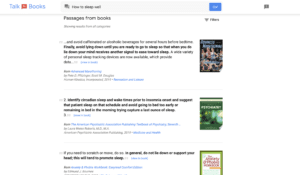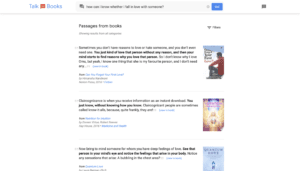Introduction
For this week I and my partner Lisa have chosen a project called Talk to Books to be the inspiration about how we can apply machine learning to improve the ability of search engines to understand our daily or oral language.
Talk to Books is produced by Google and it is a search engine but only targeting on books. Basically the user can ask Talk to Books a question by typing or speaking, and then it will list the relative part of books as the possible answers. The accuracy of the answer depends on the sentence integrity. Inputting a complete sentence instead of a few key words can get better answers. Here are some examples of my user experiences.
This is just a normal and practical question

This is more about relationship issue and it’s more difficult to answer.

From those examples I suppose that Talk to Books quite successful in understanding and analyzing our language and even some emotional queries.
Research
I did some more research about the core technology and found Natural Language Processing. According to the article written by Badreesh Shetty on the Medium, NLP is a field in machine learning with the ability of a computer to understand, analyze, manipulate, and potentially generate human language. Thus I came up with an idea about the extension of Talk to Books, which means we can use NLP to enhance the ability of search engines to comprehensively understand the user’s queries and provide more accurate answers.
Application
At this stage, thanks to NLP, search engines can analyze and understand the words in a sentence as a whole, rather than just singly analyzes and ignore connections among each word. However, there are still many things about search engine that can be improved. For example, since the form of input is now various, the user can simply say the question instead of typing it to let the search engine know. Therefore, it is necessary to improve its ability of understanding oral language and automatically filter out nonsense and meaningless modal particles. Also it would be better if the computer or machine could understand the explicit and implicit meaning of our statement. And this progress requires a stronger ability to analyze human language. Ranking search results according to the relevance of questions and improving the accuracy of targeting audience groups are also potential ways that machine learning can be used on the improvement of search engines.